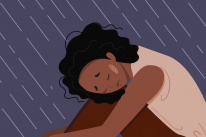
“He is a wise man who does not grieve for the things which he has not, but rejoices for those which he has.” ~Epictetus
When I lost my aunt to cancer three years ago, her death sat over me for months and acceptance didn’t begin until I had dinner with Kathy, one of my best friends.
Over noodles, I shared with Kathy all the things I wouldn’t be able to do with my aunt: the conversations we would never get to have, the places we wouldn’t get to go, the food we wouldn’t be able to eat, and the grand-nephews and nieces she wouldn’t get to hold.
Kathy asked me, “what about all the things you did get to do with your aunt?”
I shared with Kathy how every time I experienced a breakup my aunt would make me a bowl of pho and make time to reassure me that everything would be okay, how every time I thought I was working too hard and not having fun she would invite me to play cards with her, and how when I told my family I didn’t want to be a doctor and my family disapproved she supported me.
Tears sweep over my face with each story I was telling Kathy, but so did the biggest smile I had in a long time.
“You’re so lucky to have the known your aunt. Think about all the people who don’t have someone like that in their life,” Kathy said.
After that dinner, every time I thought about my aunt it would be about the memories I was grateful to have shared with her instead of the ones we wouldn’t get to have.
Kathy helped me understand that the difference between feeling happy and feeling unhappy was the difference between viewing the world in terms of what you do/did have instead of what I don’t/didn’t have.
This single lesson not only helped me come to terms with my aunt’s death but also taught me to frame potential negatives in my life into positives.
Each time my flight is delayed (and it seems to happen a lot), instead of viewing it as missing four hours of my vacation, I think about lucky I am to even have an opportunity to travel.
Each time, I forget my subway card and choose to walk back to my house to get it, I think how lucky I am to even have a subway near my house.
Years later, I found that Kathy’s lesson wasn’t just coincident but had been scientifically proven.
The Science and Data Support Kathy’s Lesson
Psychologists at the University of Northampton studied how people adapt to grief after exceptional experiences such as death of a loved one.
While this study had a small sample size and found no single factor can help overcome grief, they found having a lens of appreciating what you have/had instead of what you don’t helped one subject, “gratitude in feeling blessed to have had the time [subject] did with [loved one] as well as the overall change in his perspective, which was found to be transformative.”
The above finding about gratitude and happiness isn’t limited to just overcoming a personal loss, but can also increase our overall happiness when dealing with every day troubles.
In one study conducted at the University of California at Davis and the University of Miami, participants were randomly assigned into one of three groups and asked to keep a weekly journal.
The first group (the gratitude group) was asked to list five things they were grateful for that had occurred in the past week; the second group (the irked group) recorded five experiences that irked them from the previous week; and the third group (the control) was asked to list five events that affected them the previous week with no focus on the positive or on the negative.
When the study concluded ten weeks later, participants in the gratitude group reported feeling 25% happier and just better in general than the irked group.
How to Let This Habit Change Your Life
Though I have shared with you a practice that has changed my life and the science behind it, this habit will only change your life if you actively let it. And this is easy.
In your everyday life, you will encounter inconveniences and hassles—forgetting your keys at home, being stuck in traffic, or spilling wine on yourself. Each time this happens, simply pause and instead of focusing on the negative outcome, remind yourself of the more positive larger picture—you have a home to come back to, you have time to reflect on your day, and you have access to dry-cleaning.
Over time by focusing on the positives of an event, you will maximize your outward happiness and minimize inner suffering.
Happy man jumping image via Shutterstock
About Davis Nguyen
Davis (@IamDavisNguyen) has been a reader of Tiny Buddha since 2011. He grew up in poverty before graduating from Yale University in 2015. Davis helps people build better lives for themselves and their families by helping them develop a more powerful mindset.












 Though I run this site, it is not mine. It's ours. It's not about me. It's about us. Your stories and your wisdom are just as meaningful as mine.
Though I run this site, it is not mine. It's ours. It's not about me. It's about us. Your stories and your wisdom are just as meaningful as mine.
Great stuf! I started doing this after a traumatic time a few years ago and now I can’t help it…its engrained…and my life is so joyful now it’s insane! I think it’s a snowball.. Eventualy u learn to always see positive and life becomes amazing and I gues you become more hopeful too and inspired and you follow your heart and dreams more…so your life circumstances become more amazing too 🙂 its definitely powerful.
Wow that is incredible. I am glad it had worked for you so well!
Thank you for sharing. Valuable advice!
Thank you for your kind words!
Another way to think about how gratitude works is that it reframes our minds from that of lack to have, even in the absence of the very thing we want. When we tune into a new frequency of thought, we no longer concentrate on the problem at hand, but the solution. So, you might say that we cannot solve a problem with the same thinking that created it in the first place.
Indeed we cannot.